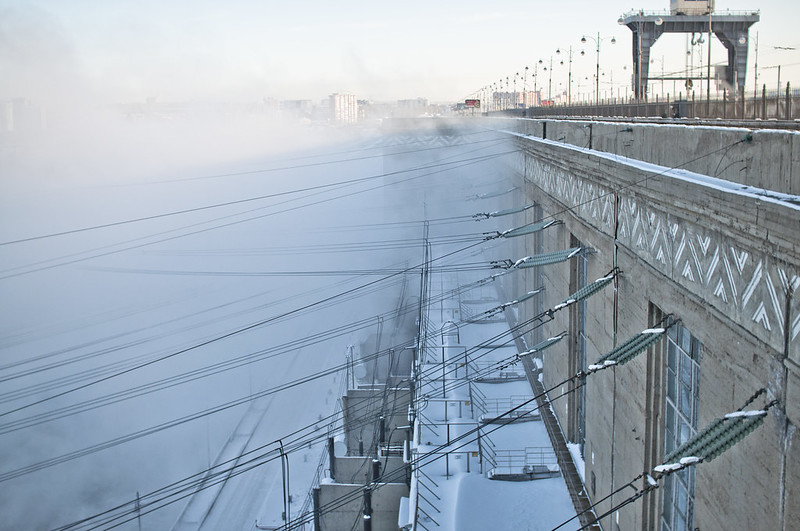The Siberian city of Irkutsk, a ‘Russia in miniature’
The 75th anniversary of the large hydroelectric power station commissioned by Stalin, still the second largest in Russia, was celebrated. Since the 18th century, Orthodox missionaries had started schools here for the religious and cultural education of Siberian peoples. But it is also the seat of the Catholic diocese of St Joseph, which serves the heir communities of Poles deported here after the anti-imperial uprisings of the 19th century.
Moscow (AsiaNews) - More than 5,000 kilometres from Moscow, on the Bolšaja Rečka, the ‘Great River’ that is the main tributary of the grandiose Lake Bajkal in Siberia, just 75 years ago the first large Siberian hydroelectric power station was built in the city of Irkutsk, the capital and archiepiscopal seat of both the Orthodox and the Catholic Church.
A number of events have been held in recent days to commemorate that event at the end of January 1950, one of the great works of Stalin's Soviet Union, recalling the words of the poet Aleksandr Tvardovsky composed for the occasion of the regulation of the flow of the other Angara River, the only one rising from Bajkal, The distance beyond the distance, in which the waves of the ‘waters that did not want to stand still / after centuries of running endless distances’ rise.
Irkutsk, founded in the mid-seventeenth century as a trading outpost for the collection of tributes (paid in furs) by the Buriato-Mongolian tribes of the area, thus became one of the most important cities in Siberia.
The development of trade and relations, together with considerable urban improvements even before Soviet times, had earned it the name ‘Siberian Paris’, and Tsarist and Soviet deportations greatly increased the number of its inhabitants.
When the dam on the Angara was built, the level of Bajkal rose by about a metre, becoming the de facto ‘maritime’ reserve of Irkutsk.
The lake was placed under the protection of Unesco as a World Heritage Site in 1996, and is one of the ‘Seven Wonders’ of Russia voted for in the early 2000s in a major television competition.
At a maximum depth of 1,642 metres, it is the deepest freshwater lake in the world, and the one with the largest volume, at 31,722 kilometres, the second largest in the world after Lake Tanganyika, making it similar to a sea.
Irkutsk is in fact the dam that holds and controls this huge expanse of water, uniting parts of the whole of Siberia in a special version of the ‘one indivisible Russia’.
The Irkutsk hydroelectric power plant is still the second largest in Russia, after the Sajano-Sušenskaya hydroelectric power plant on the Siberian Enisej River, which was started in 1963 and only completed in 2000 with great difficulty, and a catastrophic failure in 2009.
It is said that the one in Irkutsk ‘encapsulates the free spirit of Siberia’, and after all it is one of the few in Russia that does not belong to the state, although in this phase of new Putin privatisations it is not known how long it will remain in the hands of the private holding company Bajkalskaya, which recently changed its name to EvroSibEnergo, and following the war with Europe will have to rename itself.
The Irkutians are well aware that the company is the real mistress of the city, as it has been organised since the days of Yeltsin's liberalisation, and the oligarchs who run it strive to show themselves as loyal to Putin patriotism as possible. The plant's water is used not only to meet the needs of the population, but mainly for the production of aluminium, which continues to ensure large profits.
Irkutsk was the ‘dove city of the Siberian revolution’ in 1918, and has been particularly dear to the Soviet power ever since, and the legendary Damdin Sukhe-Bator, the leader of the Mongolian revolution of 1921, also known as the ‘Mongolian Lenin’, emerged from it.
The local university is also important. It opened as early as 1878 after Orthodox missionaries, such as Bishop Innokentij, had started schools for the religious and cultural education of the various Siberian peoples since the 18th century.
Many Poles were deported here after the anti-imperial uprisings of 1830 and 1863, leaving an important legacy of Catholic communities in the area, which is why it is also called ‘Siberian Poland’, with the current diocese of St Joseph led by Belarusian Bishop Kirill Klimowicz, whose territory makes it the largest in the Catholic world.
With all its stories, its works and its many personalities, Irkutsk is therefore also called ‘Russia in miniature’, always ahead of the rest of the country, towards a future with as yet unknown borders.
Photo: Flickr / Marco Fieber







.png)










